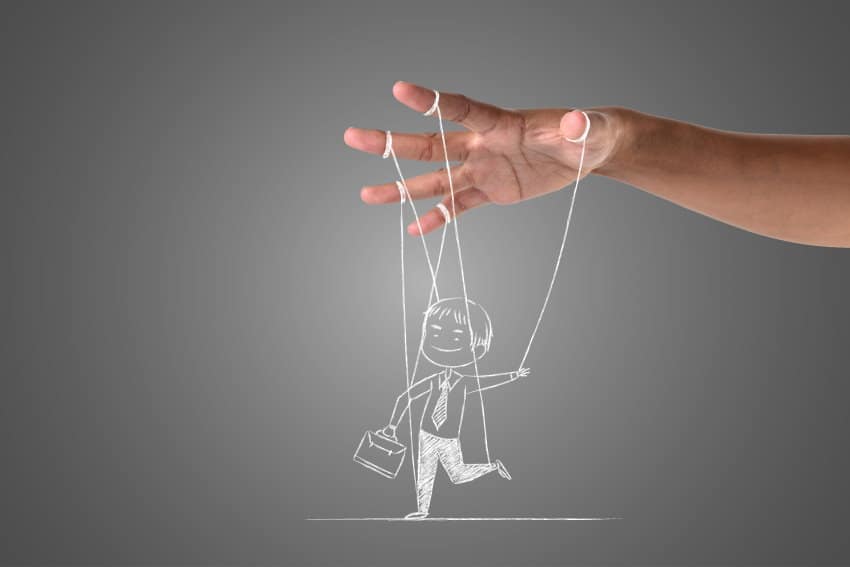Why Do Narcissists Treat You Like A Child?
*We may earn a commission for purchases made using our links. Please see our disclosure to learn more.
Narcissists often speak to the people in their lives in a condescending manner, and they don’t hesitate to respond with rage when they are triggered. Moreover, they talk to you as if they are your parent. They frequently tell you what to do, and they expect you to do it without questioning their authority. They act superior in every way to you, and they rarely give you any proper respect. In many ways, they treat you as if you are a child over whom they have ultimate control. But why do they do this?
The true answer lies in how their personality disorder affects their behavior. Though they appear confident, they are actually threatened by you and want to control and devalue you as a result. If they can minimize your contributions, they can feel superior, and it’s easier to victimize you.
I am my narcissistic mother’s child, so I know what it feels like to be treated like a child by a narcissist. It’s not a loving or kind situation. Narcissists aren’t good to their children. They traumatize them in many ways. As an adult, narcissists want you to feel ‘less than,’ often because they were treated poorly as children themselves. Now, they are projecting that treatment onto you. It’s a terrible situation because you don’t deserve that kind of treatment, but neither did they. Still, understanding the reasons can help you to respond and prevent their abuse. Let’s take a look.
1. They are Threatened by You
Narcissists are threatened by everyone in their lives. They live in almost constant fear that their true self, which they consider hopelessly flawed, will be exposed. As you can see in this video, it’s something they fear the most. You and anyone close to them are particularly dangerous because you know them well.
Since they feel threatened by you, they seek to make you seem childish. They believe they can minimize the threat you pose if you are made to feel and seem as though you are an inexperienced and ignorant child.
If they can make you feel powerless, they believe you will be less likely to undermine their efforts to prove to the world how superior they are. They also believe that they can make you out to be somehow less credible if you were to try to expose them.
They also don’t want to feel like you are someone who can outshine them. By putting into the role of a child, your abilities seem less threatening and less meaningful.
In their own childhood, the narcissist was made to feel incapable and incompetent. Whether this was due to abuse or overprotection, they got the message that they were inept. That’s what destroyed their developing sense of self and made them feel so vulnerable.
Since this is their experience of childhood, it’s how they perceive you will feel if they treat you like a child. If you are made to feel inept and incompetent, they believe they can minimize any threat you may pose to the false self-image they have so carefully constructed.
When they constructed that false self-image, they infused it with child-like, grandiose ideas of superiority. But it’s a fragile, ultimately unsustainable self-image. Almost everyone and everything in the life of a narcissist poses a threat to it.
2. They Want to Infantilize You to Control You

When you think about it, the more you can make a person feel like a child, the more you can exercise an adult’s level of control over them. It’s a mindset, really, and the narcissist learned from their own experiences that being a child equates to being under someone else’s control.
They are attempting to make you feel like a powerless child so that you will give up control over your actions and even your thoughts. They want you to become dependent upon them for your interpretation of the world.
That way, they can tell you how to think and what to do. That gives them the ultimate control over how you view them. It makes them feel all-powerful, which is consistent with the false self-image they created as a child.
To the narcissist, being a child means relinquishing control because that’s what happened in their own childhood. They had little control over their life. They were forced to depend on other people, people who often made them feel useless.
Of course, they view those experiences through a distorted identity mechanism, and they project onto you the views they developed in a dysfunctional environment. They believe that if you feel like a child, you will be much more malleable.
They will be able to influence you, shape your beliefs, and control your actions. You will need them to interpret the world around you, which means you will not be able to expose them for the flawed individual they truly believe they are.
3. It’s a Way to Devalue You

Treating you like a child is also a way for a narcissist to devalue you. No matter who you are to the narcissist, there will come a time in your relationship when they will devalue you.
Relationships with narcissists go through typical stages. They start with idealization, during which the narcissist idealizes you. They often praise you, and it may seem like you can do no wrong in their eyes.
This is usually when they are at their most charming. But it’s also the time when they are learning all about you, including your fears and insecurities.
They also begin to have unrealistically high expectations of you. These are the kinds of expectations that no one could ever live up to. It’s the narcissistic husband who expects his wife to anticipate his moods and read his mind.
No one can do that, nor should they have to, but these are the kinds of unrealistic expectations that a narcissist develops during the initial stage of a relationship. When you fail to live up to those expectations, the narcissist is more than simply disappointed.
That’s when the relationship enters the devaluation stage. This is when they begin to criticize you relentlessly. Now it seems you can do nothing right. Treating you like a child is but one way to devalue you.
They felt like they were not valued as a child, and thus, they are sending you that same message when they treat you like a child. This is when most relationships with narcissists end, usually because the victim leaves them behind.
If that doesn’t happen, however, the narcissist will often leave their victim behind. It’s a way of quitting before they get fired. If they initiate the discard, they can tell everyone how much you disappointed them.
4. It Makes Them Feel Superior

To feel even adequate, a narcissist needs to feel superior to everyone around them. When they were a child, they were made to feel inferior.
Thus, they believe that if they make you feel like a child, it’s a way of establishing their superiority. It shows everyone around them how much more capable and knowledgeable they are if they can make you look small by comparison.
It’s a sad reflection of how they were raised. They might not have been intentionally abused, but they were made to feel useless, incapable, and powerless in some way. That’s how they want you to feel.
They believe that you will turn to them to help, and when they do, it demonstrates their superiority. It’s also a way of putting you in your place.
Their place as a child was to do whatever their parents told them without question. They want to be like that for you. They want to be the person you turn to for direction, assistance, and guidance.
When you do, they feel powerful, superior, and knowledgeable. They feel like they are truly all the things they told themselves they were when they constructed that false image.
For you, it’s a sickening feeling. My mother would go to great lengths to make me feel stupid and useless. I would come away from our interactions feeling confused, powerless, and worthless. Her treatment of me ate away at my self-esteem.
While their reasons for treating you this way are sad, it’s a high price to pay for them to feel good about themselves. Additionally, they never really achieve that feeling of self-worth.
Despite the price you pay, it ultimately doesn’t do them any good. Any self-esteem boost they receive is temporary at best.
5. It’s How They Minimize Your Contribution

Another thing that treating you like a child does for the narcissist is to minimize any positive contribution you may have in their life. They were never made to feel as if what they did mattered when they were a child.
They believe, therefore, that if they treat you like a child, that will make any contributions you’ve made to their quality of life less important. It minimizes anything you might have done or continue to do for them.
I remember my mother telling me once, “It’s not like you do anything really meaningful for me!” I felt so distraught when she said that because I wanted to feel like she considered me important. I think every child wants to feel that.
But the narcissist didn’t feel that when they were a child, and in fact, they may have been told outright that they meant nothing to their abusive parents. Treating you like a child is a way of saying the same thing.
They want to believe that you don’t contribute positively to their lives because then they would need you. That would make them feel vulnerable, and narcissists simply can’t stand that. They fear vulnerability because they fear exposure.
If you can see their vulnerability, you are more likely to see their true self. No matter how much compassion you might have for the traumatized inner child you see in them, you won’t be able to help them.
Minimizing your own contributions and accepting child-like treatment will get you nothing but more abuse from a narcissist. It won’t help them, and it won’t help your relationship with them.
It’s a sad reality that narcissists can’t be grateful for what other people bring into their lives. They just can’t admit they need anything from other people.
6. It’s Easier for Them to Victimize You

Narcissists also treat their victims like children to make it easier to victimize them. If they can make you feel and seem like a child, they find it easier to take advantage of you in any way they can.
If they see you as a child, they believe you are weak and subject to easy manipulation. They felt vulnerable and weak as a child, and they were easily manipulated, so this is where they get that idea.
If you take on that identity, you might just be more susceptible to their manipulation and control. When toxic people use manipulation tactics, they count on the victim to adopt the mindset they’re trying to impose on them.
This kind of manipulation often starts in a positive manner. For example, a narcissistic boyfriend might start calling you his baby and treating you accordingly. At first, you might play along since it seems like a tender expression of love.
But soon, it becomes more manipulative and more negative. Your narcissistic abuser now begins to chastise you like a child, and they start devaluing you as stupid, naive, or weak. They start to become more aggressive and might even become physically abusive at this time.
Once they have put you into a category of a submissive or subordinate victim, they can increase the intensity of their abuse. For you, it’s so confusing because they started out as seemingly so supportive and loving.
It takes a while to process the fact that they’ve changed substantially. Unfortunately, you couldn’t have seen it coming because the narcissist is practiced at the art of deceit. They count on their charm putting you at ease at the beginning of your relationship.
7. They Feel Like They Own You

In a way, narcissistic abusers do believe they own you because they feel as though you’re an extension of their own identity. But the more they treat you like a child, the more they feel as though they have power over you.
That makes them more confident, and they feel more at ease treating you with abuse. This is how narcissists treat their own real children. My mother could easily transition from a kind, gracious hostess to people visiting our home to an abusive, denigrating monster when everyone left, and it was just the two of us.
It wasn’t something I could ever predict, but it made me anxious and constantly vigilant for any sign she was changing her mood. I had no choice because I was her child. I couldn’t leave, but narcissists count on making you feel like a helpless child, so you’ll accept their treatment even if you can choose to leave.
They feel powerful when they realize their efforts to control you are working. It feeds their ego to think they can manipulate you like that. For you, the feeling is utter confusion.
You find yourself wondering what you had done or how you can get that wonderful person you knew earlier back. You think you must have said or done something, but you can’t think of what it might be.
The truth is that this kind of behavior is part of a pattern. It’s a cycle of narcissistic abuse that has worked for the narcissist in the past. Because of that, they will use it again and again. They are drawing from their own childhood experiences to make you more vulnerable and an easier target.
8. They Feel More Like You are a Part of Them
As I’ve discussed, the narcissist sees you as an extension of their own identity. They see all the people in their life that way. Their own identity mechanism was disrupted at a formative stage of development.
That disruption causes the narcissist to need other people to provide them with what healthy people are able to provide for themselves. Healthy people can self-soothe. If you fail or feel down for some reason, you have a healthy identity mechanism that steps in to soothe yourself.
You can tell yourself that everything’s okay. You’ll know better next time. At least you’ve learned something from your failure. You can reassure yourself that you’re still a good person even though you failed.
You are able to feel a sense of self-worth even if you’ve done something wrong or bad. The narcissist can’t do any of these things. Their damaged identity mechanisms can’t reassure them or soothe them.
That’s why they need other people, and that’s also why they come to see the people around them as extensions of their own identity. In a way, they are because they are the mechanisms that soothe, reassure, and prop up the self-esteem of the narcissist.
The narcissist is so focused on protecting the secret of their flawed true self that they don’t really think much of the other people around them. They see you merely as a means to an end. They dismiss your needs, values, thoughts, and opinions just like they do with their real children.
That’s a large part of why they treat you like a child. They don’t see you as an independent entity with your own identity. You’re little more than a part of them.
9. They Feel More Important

The other thing that treating people like children does for a narcissist is it makes them feel more important. They take on a put-upon caretaker attitude. They often tell themselves that you couldn’t possibly get along without them.
When they treat you like a child, and particularly if you buy into it, they feel needed. They see themselves as indispensable. It makes them feel like a critical element of your life.
This gives them even more justification for inserting themselves into any part of your life. They have no compunction about telling you what to do.
They don’t see that you have a choice regarding whether to accept their advice or use it. They can’t believe you don’t see how wise it is. If you don’t implement the advice they’ve given you, this is often why they become enraged.
I dated a narcissistic man for a while in my early 20s. He projected an image of a wise, paternal friend to the people he knew well. He would give his friends the benefit of his sage advice with the expectation that, naturally, they would take it.
If they didn’t take his advice, he became enraged, though he never showed that to his friends. I was the one who would see that part of him. He would rage at me about them. He just couldn’t accept that they had the audacity to go against what he told them to do.
It was shocking to witness, really, and I would try to tell him that they didn’t have to take his advice. That only enraged him more. He couldn’t believe they would defy him, but what was so eerie was how he would hide all of those emotions when he saw them. They never knew he was upset with them.
10. It Justifies Their Entitlement to Your Subservience
Narcissists are all about entitlement. They have convinced themselves that they are deserving of everything good they get in life. They also believe they are entitled to do as they please.
This is part of their false image that is infused with a superiority complex. Since they are omnipotent, omniscient, and better than everyone else, they should be allowed to do whatever they feel like. That’s how they see it.
They view themselves as parental figures to the other people in their life. In their mind, you aren’t capable of doing things for yourself, so they are entitled to treat you like a subordinate, a child over whom they should have control.
They treat you like a child as part of that entitlement. You can’t do things for yourself, so if they are going to have to help you out, as they so graciously are doing, you should obey them like a child obeys their parents.
They see you as weak and helpless, and as such, you need them. If you are going to rely on them, you should adopt a submissive attitude. You should be grateful for their help as a child is grateful for their parents’ support.
11. It’s How They were Treated as Children
The ultimate reason why narcissists treat other people as children is that it’s how they were treated when they were children. They are projecting that dysfunction onto you. As Monica Sharde, who has a master’s degree in psychology, states, they do this “Because they are under an arrested development and are themselves operating from a place of childhood in many elements of their disorder.” Watch this video to learn more about on how narcissism develops.
When children are raised in a dysfunctional family dynamic, they don’t know it’s dysfunctional. It’s just how things are for them, and unless something happens to make them question what’s going on, they don’t know it’s not normal.
This really resonates with me because I didn’t know my mother was not just like everyone else’s mother for most of my childhood. It wasn’t until I was a young teenager of about 13 years old that a friend of mine remarked that a comment my mother made to me was mean.
She told me her mother would never say something like that to her. It was the first time I learned that not everyone’s mother was like mine. I was shocked, but in hindsight, I’m so grateful that happened. It set me on the path to discovery and healing.
I wasn’t narcissistic; rather, I was becoming codependent, but narcissists were equally unaware in their own childhood that anything was wrong or different. Instead, that is the model they learned for normal interactions. You’re either the controlling adult or the subordinate, controlled child in a relationship.
That’s how they see it, and they chose to become the controlling abuser instead of the submissive abuse victim. If they weren’t so toxic, you would more easily see the tragedy of their situation.
Final Thoughts
Narcissists use a lot of manipulation tactics to control the people in their lives. Treating others like children is one of them. They want to make you feel and behave like a submissive, obedient child. They will use anything at their disposal to make you take on that identity. They will even use your own emotional triggers against you.
To help you avoid that, I have created a 5-Step Roadmap to Heal Emotional Triggers. It’s a free guide that can help you recognize, defuse, and even heal your emotional triggers. It will stop a narcissistic abuser from your own emotional wounds to manipulate and control you. Just click here, and I’ll send this handy guide directly to your inbox.
--
If you want more tips for dealing with narcissists, setting boundaries, and managing emotional triggers, make sure you subscribe to my youtube channel




